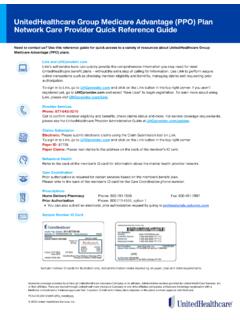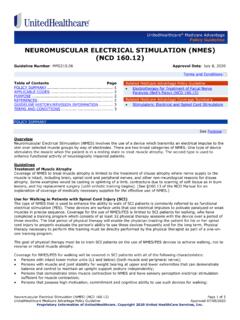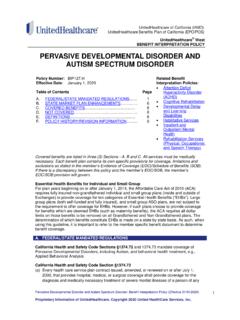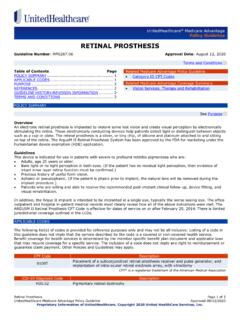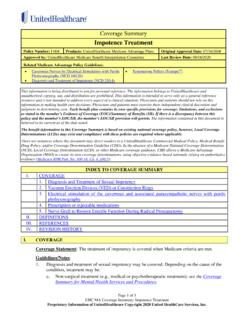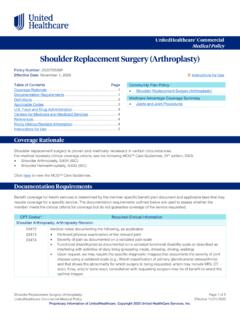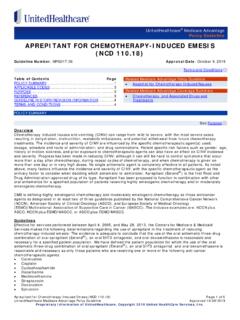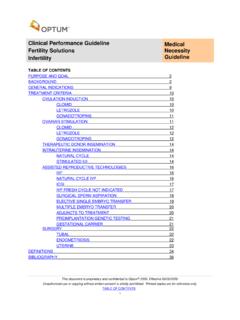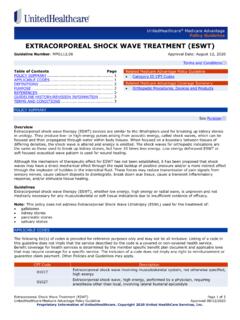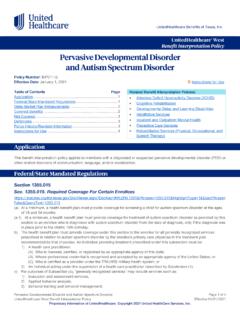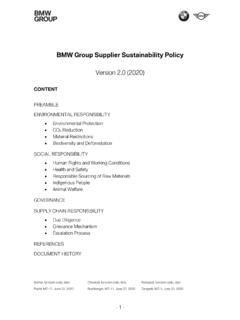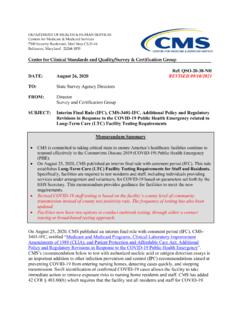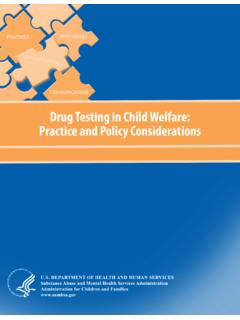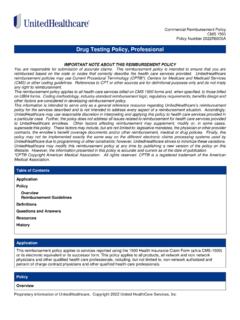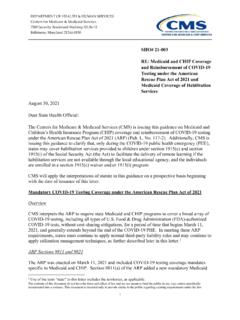Transcription of Genetic Testing for Hereditary Cancer - UHCprovider.com
1 Genetic Testing for Hereditary Cancer Page 1 of 28 UnitedHealthcare Commercial Medical policy Effective 12/01/2021 Proprietary Information of UnitedHealthcare. Copyright 2021 United HealthCare Services, Inc. UnitedHealthcare Commercial Medica l policy Genetic Testing for Hereditary Cancer policy Number: 2021T0009GG Effective Date: December 1, 2021 Instructions for Use Table of Contents Page Coverage Rationale .. 1 Documentation Requirements .. 1 Definitions .. 3 Applicable Codes .. 4 Description of Services .. 6 Clinical Evidence .. 7 Food and Drug Administration .. 21 References .. 21 policy History/Revision Information .. 27 Instructions for Use .. 28 Coverage Rationale Genetic counseling is strongly recommended prior to these tests in order to inform persons being tested about the advantages and limitations of the test as applied to a unique person.
2 Single gene Testing and known mutation Testing for familial Cancer is proven and medically necessary. Hereditary Breast and Ovarian Cancer Panel Testing Genetic Testing Panels for High Penetrance Breast Cancer Susceptibility Genes for individuals with a personal history of a BRCA-Related Cancer are proven and medically necessary in the following situations: At least one first- or second-degree relative with a BRCA-Related Cancer ; or Ashkenazi Jewish ancestry; or An unknown or Limited Family History; or A BRCA 1/2 pathogenic mutation detected in tumor tissue; or A personal history of pancreatic Cancer ; or Men with a personal history of Breast Cancer ; or Men with a personal history of metastatic prostate Cancer ; or Women with a personal history of Ovarian Cancer ; or Women with a personal history of Breast Cancer in any of the following situations: o Metastatic Breast Cancer ; or o Breast Cancer diagnosed at age 45 or younger; or o An additional Breast Cancer primary (prior diagnosis or bilateral Cancer ); or o Triple-Negative Breast Cancer diagnosed at any age; or o Lobular breast Cancer with personal or family history of diffuse gastric Cancer ; or Individual has a Tyrer-Cuzick, BRCAPro or Penn11 Score of or greater for a BRCA1/2 pathogenic variant.
3 Genetic Testing Panels for High Penetrance Breast Cancer Susceptibility Genes for individuals without a personal history of a related Cancer are proven and medically necessary in the following situations: At least one first- or second-degree relative with a BRCA-Related Cancer ; or Related Commercial policy Preventive Care Services Community Plan policy Genetic Testing for Hereditary Cancer Medicare Advantage Coverage Summaries Genetic Testing Laboratory Tests and Services Genetic Testing for Hereditary Cancer Page 2 of 28 UnitedHealthcare Commercial Medical policy Effective 12/01/2021 Proprietary Information of UnitedHealthcare. Copyright 2021 United HealthCare Services, Inc. Ashkenazi Jewish ancestry and at least one Close Blood Relative with a BRCA-Related Cancer ; or Individual has a Tyrer-Cuzick, BRCAPro or Penn11 Score of 5% or greater for a BRCA1/2 pathogenic variant Genetic Testing Panels for High Penetrance Breast Cancer Susceptibility Genes are unproven and not medically necessary for all other indications including: Screening for Cancer risk for individuals not listed in the proven indications above; or Risk assessment of other cancers; or Confirmation of direct-to-consumer Genetic Testing without meeting any of the proven indications above.
4 Other Hereditary Cancer Syndrome Multi-Gene Panel Testing Genetic Testing with a Multi-Gene Hereditary Cancer Panel in individuals with a personal history of a primary solid tumor Cancer is proven and medically necessary if all the following criteria are met: The suspected Hereditary Cancer syndromes can be diagnosed by Testing two or more genes included in the specific Hereditary Cancer panel; and o A personal history of at least two different primary solid tumor cancers; or o A personal history of BRCA-related Cancer diagnosed at age 40 or younger; or o A personal history of BRCA-related Cancer and at least one Close Blood Relative with a Cancer associated with Lynch Syndrome; or o At least one Close Blood Relative diagnosed with a BRCA-Related Cancer at age 40 or younger; or o At least two Close Blood Relatives (in addition to affected individual) on the same side of the family diagnosed with any primary solid tumor Cancer ; or o A personal history of Cancer associated with Lynch Syndrome; or o A personal history of Cancer where tumor Testing results demonstrate that the Cancer was MSI-high or had immunohistochemical staining showing the absence of one or more mismatch repair proteins (MLH1, MSH2, MSH6 or PMS2); or o A personal history of colorectal polyposis with at least 10 adenomatous polyps, at least 2 hamartomatous polyps or at least 5 serrated polyps/lesions proximal to the rectum.
5 Or o The individual has a PREMM5, MMRpro or MMRpredict Score of or greater for having a Lynch syndrome gene mutation. Genetic Testing with a Multi-Gene Hereditary Cancer Panel in individuals without a personal history of a primary solid tumor Cancer is proven and medically necessary if all the following criteria are met: The suspected Hereditary Cancer syndromes can be diagnosed by Testing two or more genes included in the specific Hereditary Cancer Panel; and o At least one first-degree relative diagnosed with at least two different primary solid tumor cancers; or o At least one first- or second-degree relative diagnosed with a BRCA-Related Cancer at age 40 or younger; or o At least three Close Blood Relatives, on the same side of the family, diagnosed with any primary solid tumor Cancer ; or o At least one first-degree relative with a Cancer associated with Lynch Syndrome.
6 Or o At least one second-degree relative with a Cancer associated with Lynch Syndrome diagnosed at age 50 or younger; or o At least one second-degree relative with at least two cancers associated with Lynch Syndrome; or o Two or more second-degree relatives with a Cancer associated with Lynch Syndrome; or o At least one first- or second-degree relative with a clinical diagnosis of Familial Adenomatous Polyposis, Attenuated Familial Adenomatous Polyposis, Juvenile Polyposis Syndrome or Peutz-Jeghers Syndrome; or o The individual has a PREMM5, MMRpro or MMRpredict Score of 5% or greater for having a Lynch syndrome gene mutation. Genetic Testing with a Multi-Gene Hereditary Cancer Panel in individuals diagnosed with Cancer at age 18 or younger is proven and medically necessary.
7 Multi-Gene Hereditary Cancer Panels are unproven and not medically necessary for all other indications. RNA Panel Testing for Hereditary cancers is unproven and not medically necessary for all indications. Genetic Testing for Hereditary Cancer Page 3 of 28 UnitedHealthcare Commercial Medical policy Effective 12/01/2021 Proprietary Information of UnitedHealthcare. Copyright 2021 United HealthCare Services, Inc. Documentation Requirements Benefit coverage for health services is determined by the member specific benefit plan document and applicable laws that may require coverage for a specific service. The documentation requirements outlined below are used to assess whether the member meets the clinical criteria for coverage but do not guarantee coverage of the service requested.
8 CPT Codes* Required Clinical Information Genetic Testing for Hereditary Cancer 0101U, 0102U, 0103U, 0129U, 0130U, 0131U, 0132U, 0133U, 0134U, 0135U, 0138U, 0238U, 81162, 81163, 81164, 81165, 81166, 81167, 81216, 81432, 81433, 81435, 81436, 81437, 81438. Medical notes documenting the following, when applicable: Personal history of the condition, if applicable, including age at diagnosis Complete family history (usually three-generation pedigree) relevant to condition being tested Genetic Testing results of family member, if applicable, and reason for Testing Ethnicity/ancestry ( , Ashkenazi Jewish), if reason for Testing Any prior Genetic Testing results How clinical management will be impacted based on results of Genetic Testing Genetic counseling (if available) *For code descriptions, see the Applicable Codes section.
9 Definitions Age Guidelines: For the statements that include age guidelines, a person is considered to be 45 years of age up until the day before their 46th birthday, and a person is considered to be 50 years of age up until the day before their 51st birthday. BRCA-Related Cancers: Breast Cancer , Ovarian Cancer , pancreatic Cancer or metastatic or high-risk (Gleason score >=7) prostate Cancer (National Comprehensive Cancer Network [NCCN], 2022). Breast Cancer : Either invasive carcinomas or non-invasive (in situ) ductal carcinoma types (NCCN, 2022). Close Blood Relatives: Are defined as follows (NCCN, 2022): First-degree relatives include parents, siblings, and offspring Second-degree relatives include half-brothers/sisters, aunts/uncles, grandparents, grandchildren, and nieces/nephews affected on the same side of the family Third-degree relatives include first cousins, great-aunts/uncles, great-grandchildren, and great grandparents affected on same side of family Founder Mutation: A Founder Mutation is a gene mutation observed with high frequency in a group that is or was geographically or culturally isolated, in which one or more of the ancestors was a carrier of the mutant gene.
10 This phenomenon is often called a Founder effect (National Cancer Institute [NCI] Dictionary of Genetics; NCCN, 2022). Gleason Scoring: Gleason Scoring is a system of grading prostate Cancer tissue based on how it looks under a microscope. Gleason Scores range from 2 to 10 and indicate how likely it is that a tumor will spread. A low Gleason Score means the Cancer tissue is similar to normal prostate tissue and the tumor is less likely to spread. A high Gleason Score means the Cancer tissue is very different from normal and the tumor is more likely to spread (NCI Dictionary of Cancer ). High Penetrance Breast Cancer Susceptibility Genes: Genes in which certain mutations are related to significantly increased likelihood of breast Cancer . NCCN includes BRCA1, BRCA2, CDH1, PALB2, PTEN, and TP53 (NCCN, 2022).
